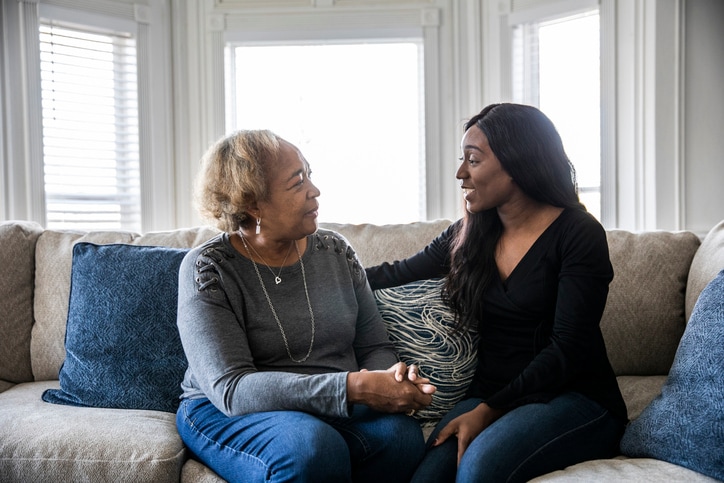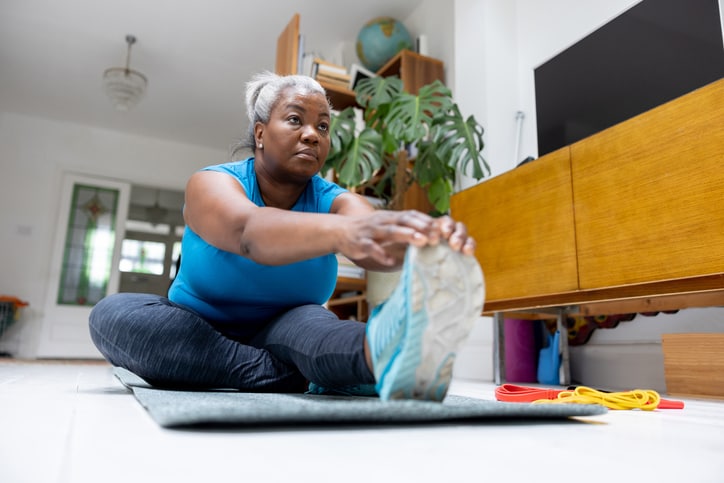Despite the certainty of aging, we tend to resist it and struggle to accept the changes. It’s a normal human reaction, but it can challenge family caregivers, especially when it comes to broaching the topic of needing hearing aids.
“No one wants to believe that they are getting old,” explains Indigo Stray Conger, licensed marriage and family therapist with Mile High Psychotherapy in Colorado. “Declining with age represents a loss of autonomy and independence that can never be reversed and will end with death. Depending on medical devices for basic functioning can bring up feelings of mortality and existential dread beyond simple hearing loss.”
So how can you overcome these barriers and talk to your loved one about getting hearing aids? Experts share their best advice below.
When to bring up hearing aids
While hearing loss significant enough for hearing aids can happen anytime, it commonly starts in our 50s, according to Lorienne M. Jenstad, an audiologist, who holds her doctorate in audiology with a focus on hearing aid processing for older adults, and associate professor at the University of British Columbia’s School of Audiology and Speech Sciences.
“About 25% of people in their 60s could benefit from hearing aids, and this number rises to about 80% of people 80 years and older,” notes Jenstad. Many factors lead to age-related hearing loss and can accumulate over time, she says, which could include genetic predisposition, damage from loud noise exposure, medications and certain diseases.
Some people wonder, “Do I need a hearing aid?” But hearing loss is often a gradual process, and for many, so is the process of recognizing and accepting it. So start floating concerns before it’s critical, Conger says. “Don’t expect them to agree to utilize a hearing aid the same day you talk with them, or even the same year,” Conger adds. In fact, Jenstad says it can take seven to 10 years for people to address their hearing loss.
Charmaine Conaghan, the executive director and owner of Always Best Care North Shore, an in-home senior care company, a certified senior advisor and certified dementia practitioner has found that addressing hearing loss is especially vital for seniors with memory loss or dementia.
“Hearing loss can exacerbate dementia; it further isolates them and makes their world even smaller,” she explains. “If you’re not using your brain to interact with people because you can’t hear them, your memory will decline that much more quickly.”
“About 25% of people in their 60s could benefit from hearing aids, and this number rises to about 80% of people 80 years and older.”
—Lorienne M. Jenstad, an audiologist
Common objections to needing a hearing aid — and how to overcome them
Bringing up hearing aids with your loved one can elicit complicated feelings, and it likely isn’t a one-and-done conversation but an ongoing discussion. As you start introducing the idea, here are some common objections to prepare for.
They’re too expensive
Conaghan and Jenstad both find that price is a top objection to hearing aids. That’s no surprise since many insurers, including traditional Medicare — don’t cover hearing aids (some Medicare Advantage/Part C plans do).
Jenstad says it can help to explain “that the sticker price of hearing aids usually includes the devices themselves, the professional’s time for hearing assessment, individualized fitting and adjustment of the hearing aids, and follow-up care.” She says there’s usually a trial period that can offer time to make a final call.
Conaghan adds that hearing aids come in a wide range of price points, and some big box stores offer benefits like a one-time replacement of a lost pair, which can allay financial fears.
I don’t want to deal with batteries
Batteries on old-school hearing aids are a headache and extra cost, Conaghan says. “I’ve had clients stop using hearing aids because of the batteries since they notoriously have a short life, you go through them so quickly, they’re fickle, and they’re hard to get in and out, especially for older fingers,” she says.
But things are changing: “Nowadays, there are hearing aids that are chargeable, and oh my gosh it’s so much easier!” Conaghan says. Her husband just got rechargeable hearing aids, which have a charging case similar to AirPods and technology like Bluetooth connectivity that uses hearing aids for calls.
I hear just fine
Since age-related hearing loss is gradual and early stages are subtle, Jenstad says, someone may still hear adequately in quiet settings. Hearing eventally becomes harder in noisy backgrounds, but some people experience denial and say the problem is just their environment — not their hearing, Jenstad explains.
When your loved one claims their hearing isn’t a problem or blames it on outside factors, it’s helpful to gently highlight examples of when they struggled to hear.
It’s not your business
Seniors may react by insisting it’s not of anyone else’s concern, says Conger. But that’s incorrect.
“There is a lot of evidence that hearing loss impacts not only the individual, but their communication partners as well, and the most powerful way to see change happen is to be clear about the impact on others,” Jenstad says.
Conger suggests using “I” statements to frame your concerns, which makes them harder to dismiss. For example, Conger says, the statement, “You can’t hear me when I talk to you on the phone anymore” is far less impactful than this: “I was really scared when I was trying to tell you something important over the phone and you couldn’t understand what I was saying.”
Jenstad recommends a multi-pronged approach when possible: Start with something factual, like, “I’ve noticed that you often ask me to repeat myself when we’re talking.” Then state the impact on the family member, like, “I am concerned this is impacting our relationship.” Then, end with a clear ask, such as, “I’d like for both of us to get our hearing checked,” Jenstad says.
I don’t want people to see I’m wearing hearing aids
While not the case for everyone, “there are complex concerns about image when wearing hearing aids, including stigma, or fear of seeming older,” Jenstad says. “I reassure people that hearing aids themselves are often much less noticeable than hearing loss.”
Plus, as technology rapidly changes and improves, hearing aids now come in a variety of styles, colors and sizes, and some are invisible when fitted correctly.
I don’t know where to start
Once someone accepts their hearing loss, the next steps may be unclear. “People with hearing loss often express to me their fear about how much research they feel they need to do in advance to choose the right hearing aid or understand all their options before they seek help,” Jenstad says.
She adds that this is different from other big purchases like a car; it’s a medical device that comes with experts to help with hearing aids for seniors. “Their audiologist can help guide them towards solutions that will work best for their own hearing loss, lifestyle, and listening needs,” she says.
“This is not just about hearing aids; the thing about getting older that family caregivers tend to forget is as we age and parts of our body start to fail us, we start losing control. Many of the objections that seniors pose are surrounding control, and if you’re losing control of your life by inches, you’re going to take some control where you can get it.”
—Charmaine Conaghan, a certified senior advisor and certified dementia practitioner
Tips for discussing hearing aids with seniors
Now that you’re prepared for how to counter objections to hearing aids, here are some expert tips on making your discussions more productive and supportive.
Back up
Before automatically assuming your loved one needs hearing aids, explore other solutions first, Jenstad suggests. It’s both practical and can soften the blow to a senior’s pride.
“Going for a hearing test is less of a commitment, so it might be easier to take that step just to find out what’s going on,” she says. “The audiologist may have suggestions for hearing help that are not about hearing aids. It could be as simple as impacted wax in the ear canal that can be removed!”
Lead with love
“Family member concerns about hearing loss can be dismissed if they are seen as nagging or angry,” Jenstad says. “The best approach to raising concerns is clear, gentle and loving.” Likewise, Conger advises to “keep impatience, judgment and negative emotion out of your tone.”
Rather than starting off with a big, intimidating talk, Conger suggests occasionally pointing out hearing issues in real time to plant seeds for a more serious conversation later. For example, pointing out that you’re having to speak very loudly to be heard by them.
Conaghan adds that family caregivers, especially younger ones, should be aware of the emotion in this process and listen to objections with empathy.
Take your time
Operate on your loved one’s timetable, which is different for everyone. Conaghan remembers it taking her mother four long years to begrudgingly get hearing aids. But her husband just got them on his own volition in his fifties after recognizing it was a problem worth addressing.
Forcing, rushing or guilt-tripping someone is unproductive, and it might backfire, Conaghan says. “This is not just about hearing aids; the thing about getting older that family caregivers tend to forget is as we age and parts of our body start to fail us, we start losing control,” Conaghan notes. “Many of the objections that seniors pose are surrounding control, and if you’re losing control of your life by inches, you’re going to take some control where you can get it.”
Pushing someone who’s not ready to get hearing aids could make them feel out of control or even embarrassed, Conaghan says. This could cause them to double down since it doesn’t feel like their decision. So you can nudge, but don’t force it.
Make it personal
We mentioned earlier how it can help to emphasize impacts on family. Another tactic, which could resonate better with some, is pointing out ways it’s impacting them. Conger suggests tailoring your approach to their personality.
“If you know your loved one enjoys the independence of driving, express how worried you are about the dangers of driving without being able to hear everything,” she shares as an example. Another, she adds, is if they love time with grandkids, point out how nice it would be to hear everything and therefore feel fully engaged when playing together.
The bottom line on talking to a senior loved one about a hearing aid
Accepting that we’re aging and losing abilities is just plain hard for that person and their family. If your loved one’s hearing loss is becoming noticeable or problematic, it’s easier for everyone when you avoid making demands, Conaghan says. It goes smoother when you gently point out issues, address objections with patience and support them on their journey in their own timeline.
While it’s easy to view getting hearing aids as a negative, Conaghan suggests instead finding ways to frame it as a positive decision that would improve their quality of life and make it richer.
She says that means avoiding language like “You’ve got to get this done” and instead saying things like, “Mom, you can’t hear my toddler using their first words; don’t you want to hear that?”
It might be hard to go slow, especially if you’re tired of repeating yourself. But this approach works far better than guilt tripping or forcing them and respects their complicated feelings at this stage of getting older, says Conaghan who concludes, “You have to respect their dignity.”





